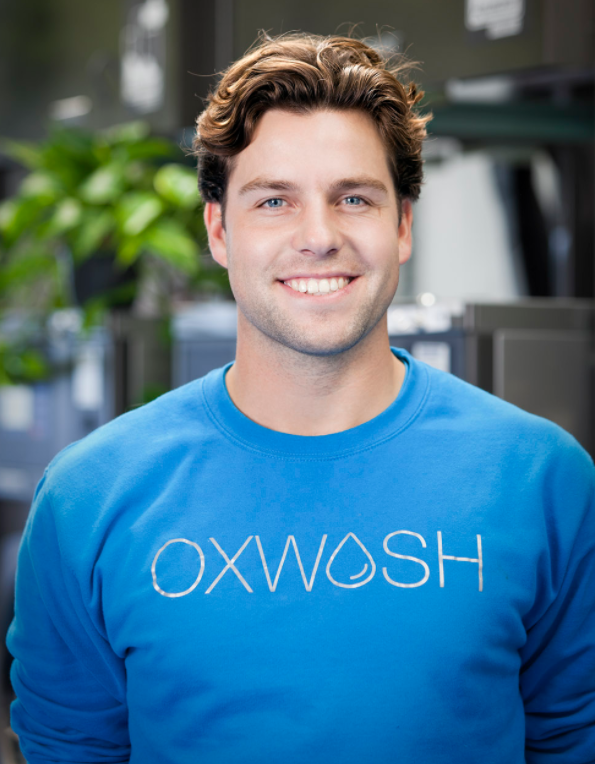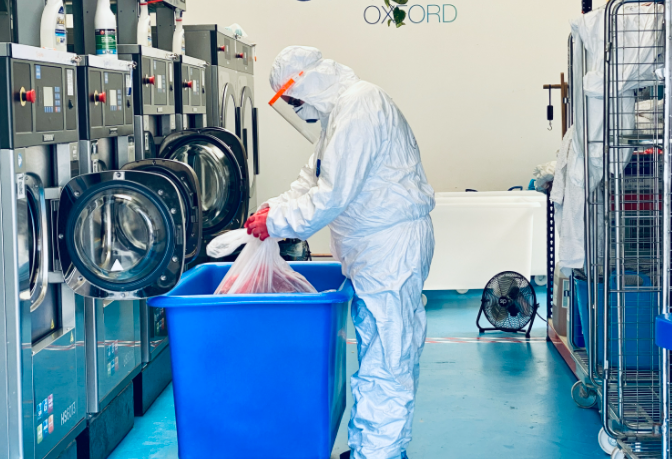Are you looking at ways of reducing your carbon emissions? So you have chosen a green energy supplier and opted to buy more locally-grown food. Chances are though that you haven’t thought much about how you wash your clothes. Kyle Grant who is the founder of the startup Oxwash thinks you should.
His startup, whose services are available to consumers in Oxford, Cambridge and Battersea , is committed to cleaning consumers clothes in the greenest way possible.
Here he explains what the environmental issue is with home washing, how Oxwash’s solution can cut carbon emissions and what impact Covid-19 has had on his business. He also talks about how his company’s most high profile backer – the founder of Twitter Biz Stone – came to invest.
So what’s the problem with the way we currently wash clothes?
Many individuals are unaware how polluting a traditional washing machine is. It’s become a habit to use domestic washers and dryers regularly without considering the environmental impact of the machines and washing process. By using Oxwash our customers can prevent 1.4kg of CO2 from being emitted per wash compared to using their own washers and dryers at home.
The main difference is that where possible we wash with cold water of approximately 20˚C. This means the energy required to heat vast amounts of water is reduced dramatically and the energy required to run our washers can come entirely from renewable energy. We also have systems that weigh the laundry of different material types in our washers and algorithms automatically calculate and then choose the minimum amount of water, chemistry and energy required to get a wash load clean and fresh.
One of the biggest issues surrounding laundry is it causes one third of all ocean plastic pollution in the form of plastic microfibres. Think polyester and nylon… We’re testing and fitting microfibre filters across our network of lagoons to tackle this issue at source and responsibly recycle the fibres rather than let them go down the drain.
And how did Oxwash come about? Was there a ‘Eureka’ moment that led to its genesis?
I founded Oxwash in 2018 while completing my PhD at Oxford University, mainly out of frustration from the perpetually broken washing machines in my college laundry. It all started with my bike and a backpack, collecting and washing clothes for my friends and other students, this rather rapidly snowballed into a growing on-demand laundry business as interest grew. After looking into the commercial laundry industry and lifting the lid on how wasteful and pollutive it truly is, Oxwash has made it our mission to build the future of laundry, a service with no environmental impact and world-class results.
Explain about the wet cleaning technique – how does it work and what are its key benefits?
Wet cleaning mirrors gentle hand-washing. The wet cleaning chemistry and processes use only water and biodegradable detergents rather than the carcinogenic solvents used in ‘traditional ‘dry cleaning’.
Dry cleaning causes many health issues ranging from respiratory failure to cancer. It can also have adverse effects on the human nervous system, causing headaches, movement difficulties and memory loss. These effects are caused by the use of PERC (perchloroethylene), a colourless solvent derived from petroleum fractionation. To help limit any potential health risks, the U.S. Environmental Protection Agency has ruled that dry cleaners must phase out dry cleaning machines that use PERC by December 21, 2020. Time for the UK to follow!
Benefits include:
- A superior natural way of cleaning fabrics
- No harsh chemicals such as chlorine or phosphates are used protecting both your garments and you
- Uses water and mild biodegradable detergents instead of polluting chemicals such as PERC, so no toxic waste is produced
- Leaves a fresh natural scent instead of a chemical odour
- Removes organic stains better than dry cleaning
- Turn around time is half that of dry cleaning
- There are minimal epidermal issues and the process is hypoallergenic and more suitable for sensitive skin
- Gentle drum rotation with water showering means less felting, friction and material damage
- Dynamic drying temperatures can be up to 80% less than in dry cleaning machines
You are currently in three locations – what are your expansion plans? Are you looking for more investment? How did Biz Stone end up investing in you?
To scale we have been focused in recent months on building the agile and efficient processing sites in Oxford, Cambridge and Battersea so that we can now grow our user base with a fully integrated service. Our focus now shifts to enhancing the technology of washing and personalisation so that we can offer entirely bespoke services to our customers, no matter their requirement. By bringing new technology to bear such as data analytics and machine learning to manage our processing flow and logistics, we’ll be able to serve more people, more rapidly and with less impact on the environment.
We’re currently raising a round of investment to take Oxwash nationwide and roll out our platform to support circular economy clients. Biz Stone the cofounder of Twitter and I met whilst on the Oxford Foundry Accelerator in Oxford and he has been a mentor and investor ever since!

How did Covid-19 impact your business?
Our original goal for the business remains to help the planet – originally focussing on the eco-friendly nature of our tech compared to traditional laundry options. However, in light of recent months and the impact of Covid-19 it’s become apparent that our help is needed in keeping people safe and so a huge shift of focus has turned to hygiene and providing disinfection not only for our customers but also healthcare providers such as GP practices and the Oxford/AstraZeneca vaccine trials too.
Naturally the focus on hygiene for both business and personal customers has increased in 2020, and Oxwash are perfectly placed to deliver a service with hygiene and quality guarantees, not just for personal laundry, but for heavily affected COVID businesses in healthcare and research. We pride ourselves on our award-winning process that has been scientifically shown to exceed NHS standards of disinfection (>99.99999% microorganism eradication) for both individuals everyday laundry and Oxford vaccine trial scrubs alike.
During the peak of Covid we were pleased to launch a Donate-a-Wash service where NHS workers, elderly members of the community and vulnerable individuals were given three free washes. Apart from being popular with healthcare businesses due to our enhanced hygiene methods, our service has become very popular with those needing to self-isolate who don’t have washing facilities at home. We have a system in place with contactless collection and delivery as well as the use of soluble bags which keeps our staff and our customers safe. We hope to continue supporting businesses in the hospitality industry and consumers almost equally in terms of revenue, in this new normal.
You have secured some high profile partnerships with companies like Airbnb. What’s the split between consumers and corporates? Will you inevitably end up focusing on or the other in the long run?
The business model is currently a blend of ad hoc orders via our website/app, and contracts with businesses. Moving forwards we will be implementing laundry subscriptions for our customers that take the hassle away from intermittent app/webapp usage and treat our service more like milk delivery, at the same time every week. Eventually, we see ourselves akin to Ocado and becoming the de-facto platform for running laundry services at scale internationally.
Approximately 40% of our customer base are small-medium sized businesses, the other 60% are households and individuals. We are now seeing more and more healthcare and scientific clients as well as starting to work on some exciting partnerships with rental companies, hotel chains and circular economy platforms.
We are developing a modular and rapidly scalable model that we will deploy into new cities across the UK as well as to other countries, targeting North America and Europe. We will license our technology to partners in other geographies to scale rapidly on our platform. Our goal is to eradicate the impact of washing on the world’s ecosystems whilst developing the ultimate in cleanliness and textile longevity. We are determined to lead the charge and prove a closed-loop washing process and service is possible.
In terms of expansion is the lack of cycle lanes in some urban areas a key barrier? Would you consider using EVs?
Cycle infrastructure improvements are always welcome, Cambridge has some of the most cycle-friendly infrastructure in place that we would love to see elsewhere. We would like to see regulation changes to define what is acceptable use for eCargo bikes, as it would be awful for an accident to occur and shotgun regulation to clamp down on their uses unnecessarily. Other than that distance is another key factor: our riders often average 30+ miles a day, but we are unable to serve areas far outside the city centre. We are looking to introduce electric vans to our fleet to expand our reach and offer a hub and spoke logistics model to serve key areas (business parks etc) outside our main urban hubs.
They say entrepreneurs often have optimistic personalities? How do you remain positive in this time of Covid and with climate change starting to have an impact?
As an entrepreneur you’re faced with a plethora of problems from team members getting ill to legal restructuring of your entire business. Don’t be afraid to ask for help! Surround yourself with industry experts from all walks of life who have been through the wringer. Listen and learn from advisors and hire team members who bring differing views and perspectives. Build a resilient team greater than the sum of their parts. With the impact of Covid-19 I’ve taken the view that radical transparency and honesty is the best policy and although the news may not be good news, sharing it openly with all the team always builds trust and cohesion.




